King Saud University HHA 507: Public Health Ethics Case Study Report
VerifiedAdded on 2022/09/11
|6
|1023
|31
Case Study
AI Summary
This case study examines ethical dilemmas faced by a nurse, Sarah, in a public health setting, specifically focusing on patient confidentiality and the implications of HIPAA regulations. The case presents two scenarios: the first involves Sarah's responsibility to protect a patient's medical information, and the second explores whether Sarah should disclose a friend's fiancé's health status to her. The analysis highlights the importance of adhering to ethical principles of privacy, confidentiality, and integrity in healthcare practice. The study emphasizes the conflict between public health needs and individual patient rights, advocating for environments that promote both physical and auditory privacy to safeguard sensitive information. The provided references support the discussion with relevant literature on patient confidentiality and ethical considerations in electronic health records and public health practices.
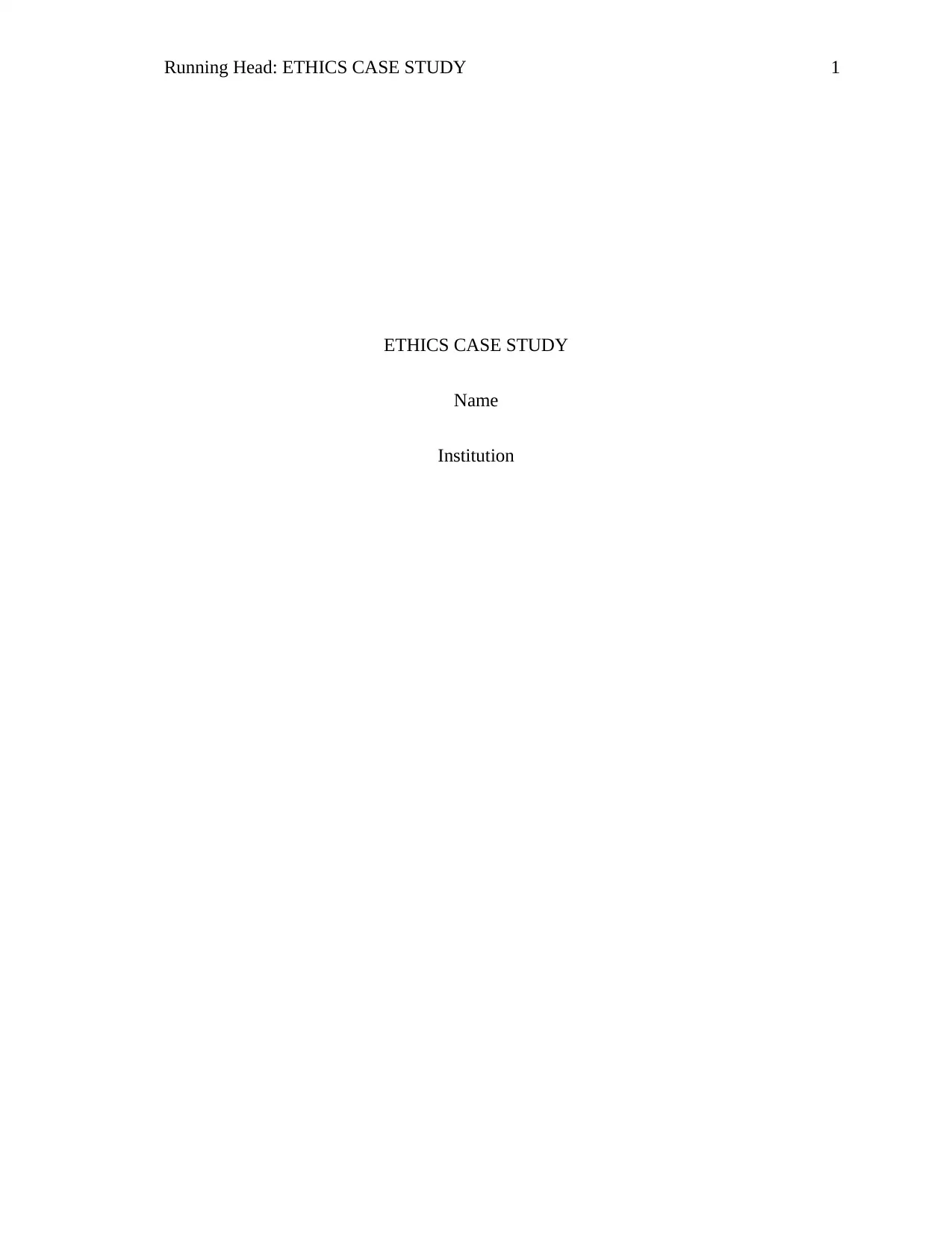
Running Head: ETHICS CASE STUDY 1
ETHICS CASE STUDY
Name
Institution
ETHICS CASE STUDY
Name
Institution
Paraphrase This Document
Need a fresh take? Get an instant paraphrase of this document with our AI Paraphraser
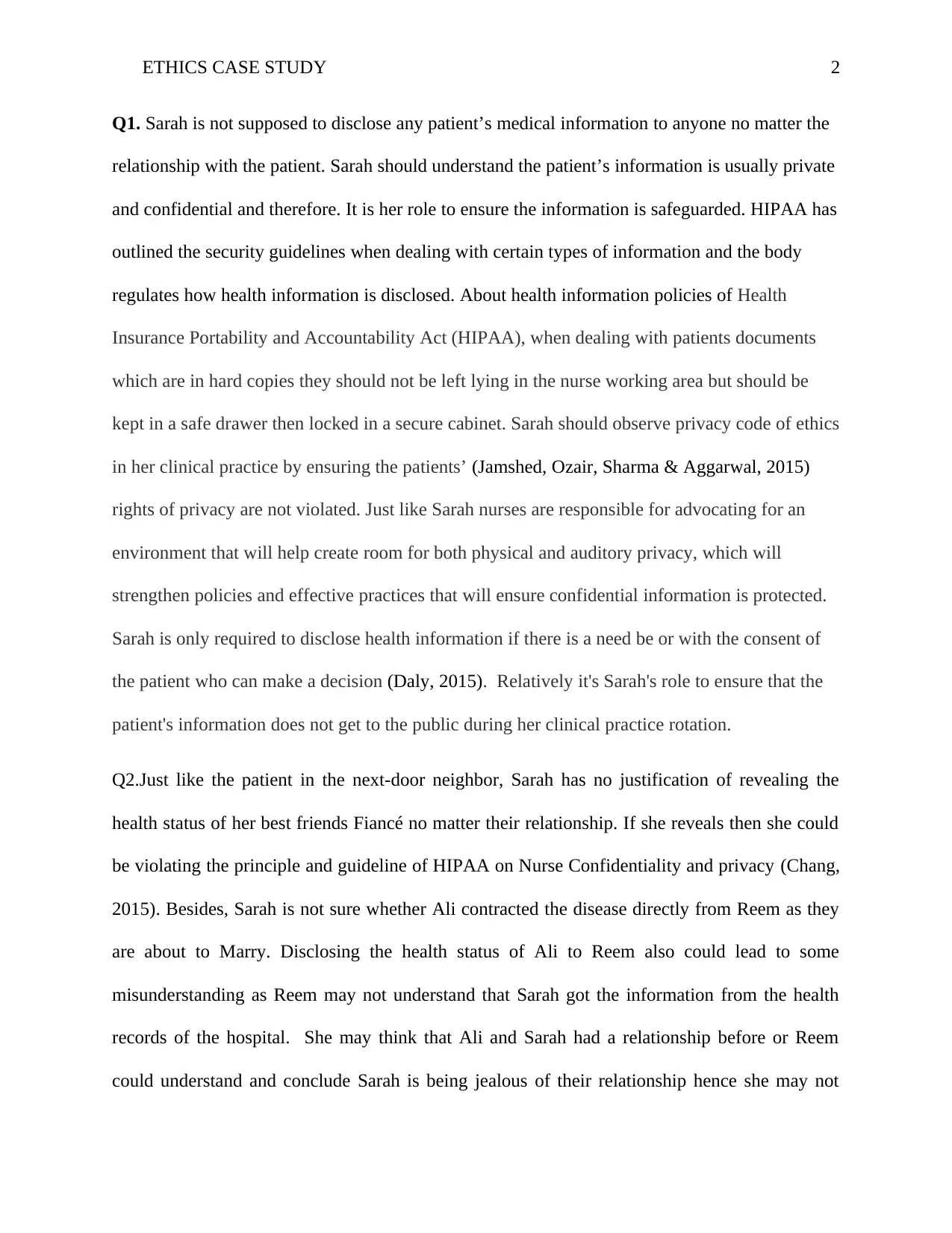
ETHICS CASE STUDY 2
Q1. Sarah is not supposed to disclose any patient’s medical information to anyone no matter the
relationship with the patient. Sarah should understand the patient’s information is usually private
and confidential and therefore. It is her role to ensure the information is safeguarded. HIPAA has
outlined the security guidelines when dealing with certain types of information and the body
regulates how health information is disclosed. About health information policies of Health
Insurance Portability and Accountability Act (HIPAA), when dealing with patients documents
which are in hard copies they should not be left lying in the nurse working area but should be
kept in a safe drawer then locked in a secure cabinet. Sarah should observe privacy code of ethics
in her clinical practice by ensuring the patients’ (Jamshed, Ozair, Sharma & Aggarwal, 2015)
rights of privacy are not violated. Just like Sarah nurses are responsible for advocating for an
environment that will help create room for both physical and auditory privacy, which will
strengthen policies and effective practices that will ensure confidential information is protected.
Sarah is only required to disclose health information if there is a need be or with the consent of
the patient who can make a decision (Daly, 2015). Relatively it's Sarah's role to ensure that the
patient's information does not get to the public during her clinical practice rotation.
Q2.Just like the patient in the next-door neighbor, Sarah has no justification of revealing the
health status of her best friends Fiancé no matter their relationship. If she reveals then she could
be violating the principle and guideline of HIPAA on Nurse Confidentiality and privacy (Chang,
2015). Besides, Sarah is not sure whether Ali contracted the disease directly from Reem as they
are about to Marry. Disclosing the health status of Ali to Reem also could lead to some
misunderstanding as Reem may not understand that Sarah got the information from the health
records of the hospital. She may think that Ali and Sarah had a relationship before or Reem
could understand and conclude Sarah is being jealous of their relationship hence she may not
Q1. Sarah is not supposed to disclose any patient’s medical information to anyone no matter the
relationship with the patient. Sarah should understand the patient’s information is usually private
and confidential and therefore. It is her role to ensure the information is safeguarded. HIPAA has
outlined the security guidelines when dealing with certain types of information and the body
regulates how health information is disclosed. About health information policies of Health
Insurance Portability and Accountability Act (HIPAA), when dealing with patients documents
which are in hard copies they should not be left lying in the nurse working area but should be
kept in a safe drawer then locked in a secure cabinet. Sarah should observe privacy code of ethics
in her clinical practice by ensuring the patients’ (Jamshed, Ozair, Sharma & Aggarwal, 2015)
rights of privacy are not violated. Just like Sarah nurses are responsible for advocating for an
environment that will help create room for both physical and auditory privacy, which will
strengthen policies and effective practices that will ensure confidential information is protected.
Sarah is only required to disclose health information if there is a need be or with the consent of
the patient who can make a decision (Daly, 2015). Relatively it's Sarah's role to ensure that the
patient's information does not get to the public during her clinical practice rotation.
Q2.Just like the patient in the next-door neighbor, Sarah has no justification of revealing the
health status of her best friends Fiancé no matter their relationship. If she reveals then she could
be violating the principle and guideline of HIPAA on Nurse Confidentiality and privacy (Chang,
2015). Besides, Sarah is not sure whether Ali contracted the disease directly from Reem as they
are about to Marry. Disclosing the health status of Ali to Reem also could lead to some
misunderstanding as Reem may not understand that Sarah got the information from the health
records of the hospital. She may think that Ali and Sarah had a relationship before or Reem
could understand and conclude Sarah is being jealous of their relationship hence she may not
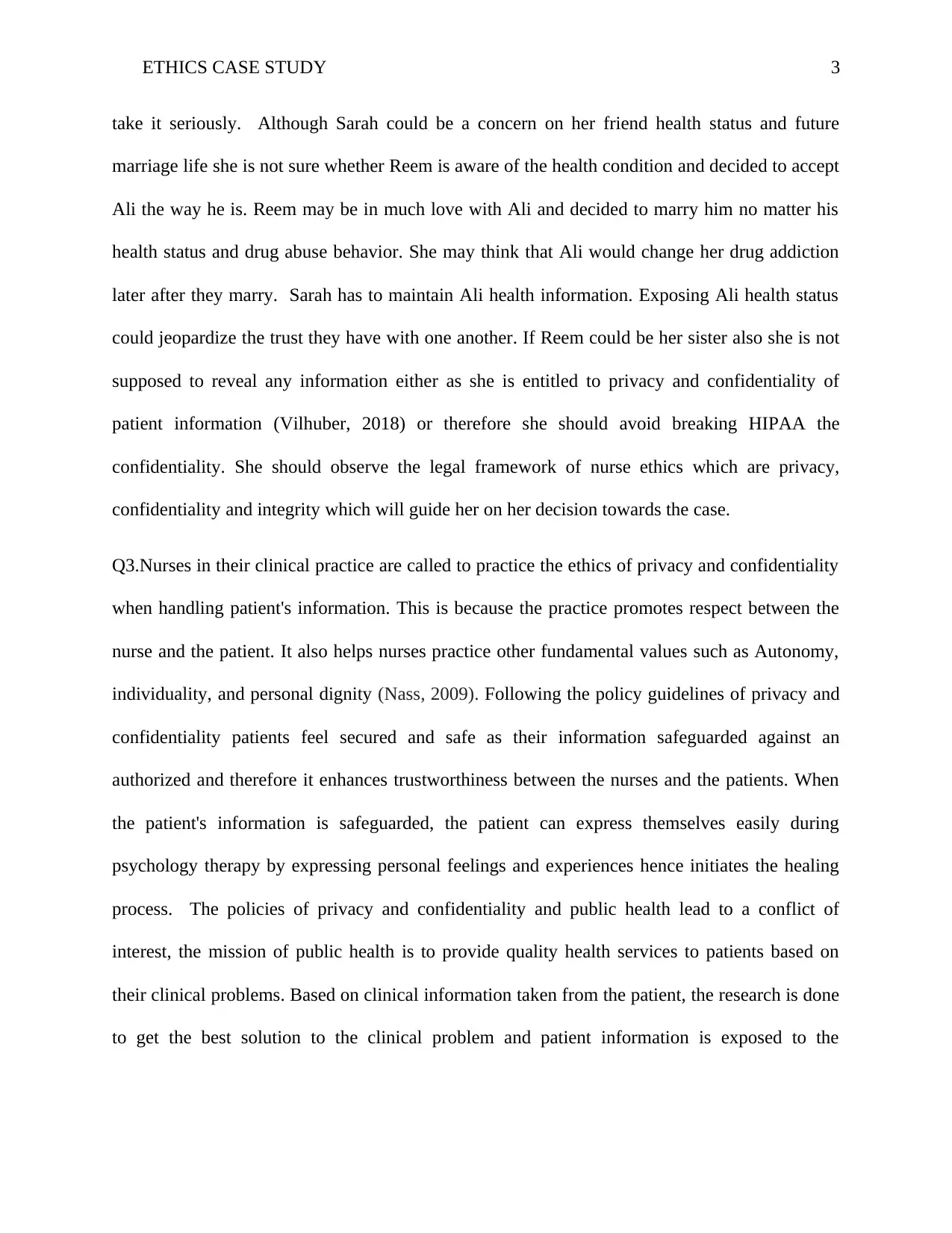
ETHICS CASE STUDY 3
take it seriously. Although Sarah could be a concern on her friend health status and future
marriage life she is not sure whether Reem is aware of the health condition and decided to accept
Ali the way he is. Reem may be in much love with Ali and decided to marry him no matter his
health status and drug abuse behavior. She may think that Ali would change her drug addiction
later after they marry. Sarah has to maintain Ali health information. Exposing Ali health status
could jeopardize the trust they have with one another. If Reem could be her sister also she is not
supposed to reveal any information either as she is entitled to privacy and confidentiality of
patient information (Vilhuber, 2018) or therefore she should avoid breaking HIPAA the
confidentiality. She should observe the legal framework of nurse ethics which are privacy,
confidentiality and integrity which will guide her on her decision towards the case.
Q3.Nurses in their clinical practice are called to practice the ethics of privacy and confidentiality
when handling patient's information. This is because the practice promotes respect between the
nurse and the patient. It also helps nurses practice other fundamental values such as Autonomy,
individuality, and personal dignity (Nass, 2009). Following the policy guidelines of privacy and
confidentiality patients feel secured and safe as their information safeguarded against an
authorized and therefore it enhances trustworthiness between the nurses and the patients. When
the patient's information is safeguarded, the patient can express themselves easily during
psychology therapy by expressing personal feelings and experiences hence initiates the healing
process. The policies of privacy and confidentiality and public health lead to a conflict of
interest, the mission of public health is to provide quality health services to patients based on
their clinical problems. Based on clinical information taken from the patient, the research is done
to get the best solution to the clinical problem and patient information is exposed to the
take it seriously. Although Sarah could be a concern on her friend health status and future
marriage life she is not sure whether Reem is aware of the health condition and decided to accept
Ali the way he is. Reem may be in much love with Ali and decided to marry him no matter his
health status and drug abuse behavior. She may think that Ali would change her drug addiction
later after they marry. Sarah has to maintain Ali health information. Exposing Ali health status
could jeopardize the trust they have with one another. If Reem could be her sister also she is not
supposed to reveal any information either as she is entitled to privacy and confidentiality of
patient information (Vilhuber, 2018) or therefore she should avoid breaking HIPAA the
confidentiality. She should observe the legal framework of nurse ethics which are privacy,
confidentiality and integrity which will guide her on her decision towards the case.
Q3.Nurses in their clinical practice are called to practice the ethics of privacy and confidentiality
when handling patient's information. This is because the practice promotes respect between the
nurse and the patient. It also helps nurses practice other fundamental values such as Autonomy,
individuality, and personal dignity (Nass, 2009). Following the policy guidelines of privacy and
confidentiality patients feel secured and safe as their information safeguarded against an
authorized and therefore it enhances trustworthiness between the nurses and the patients. When
the patient's information is safeguarded, the patient can express themselves easily during
psychology therapy by expressing personal feelings and experiences hence initiates the healing
process. The policies of privacy and confidentiality and public health lead to a conflict of
interest, the mission of public health is to provide quality health services to patients based on
their clinical problems. Based on clinical information taken from the patient, the research is done
to get the best solution to the clinical problem and patient information is exposed to the
⊘ This is a preview!⊘
Do you want full access?
Subscribe today to unlock all pages.

Trusted by 1+ million students worldwide
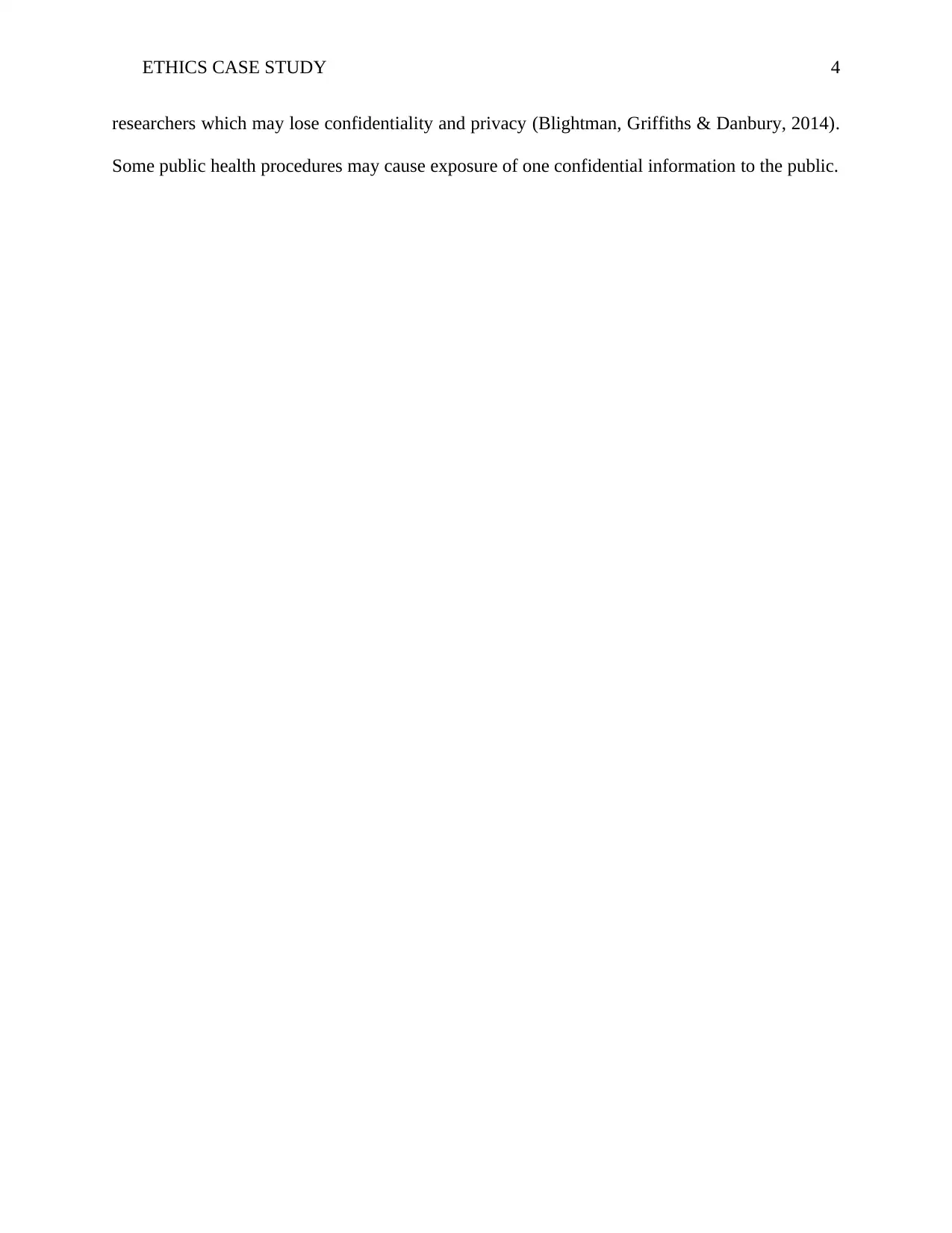
ETHICS CASE STUDY 4
researchers which may lose confidentiality and privacy (Blightman, Griffiths & Danbury, 2014).
Some public health procedures may cause exposure of one confidential information to the public.
researchers which may lose confidentiality and privacy (Blightman, Griffiths & Danbury, 2014).
Some public health procedures may cause exposure of one confidential information to the public.
Paraphrase This Document
Need a fresh take? Get an instant paraphrase of this document with our AI Paraphraser
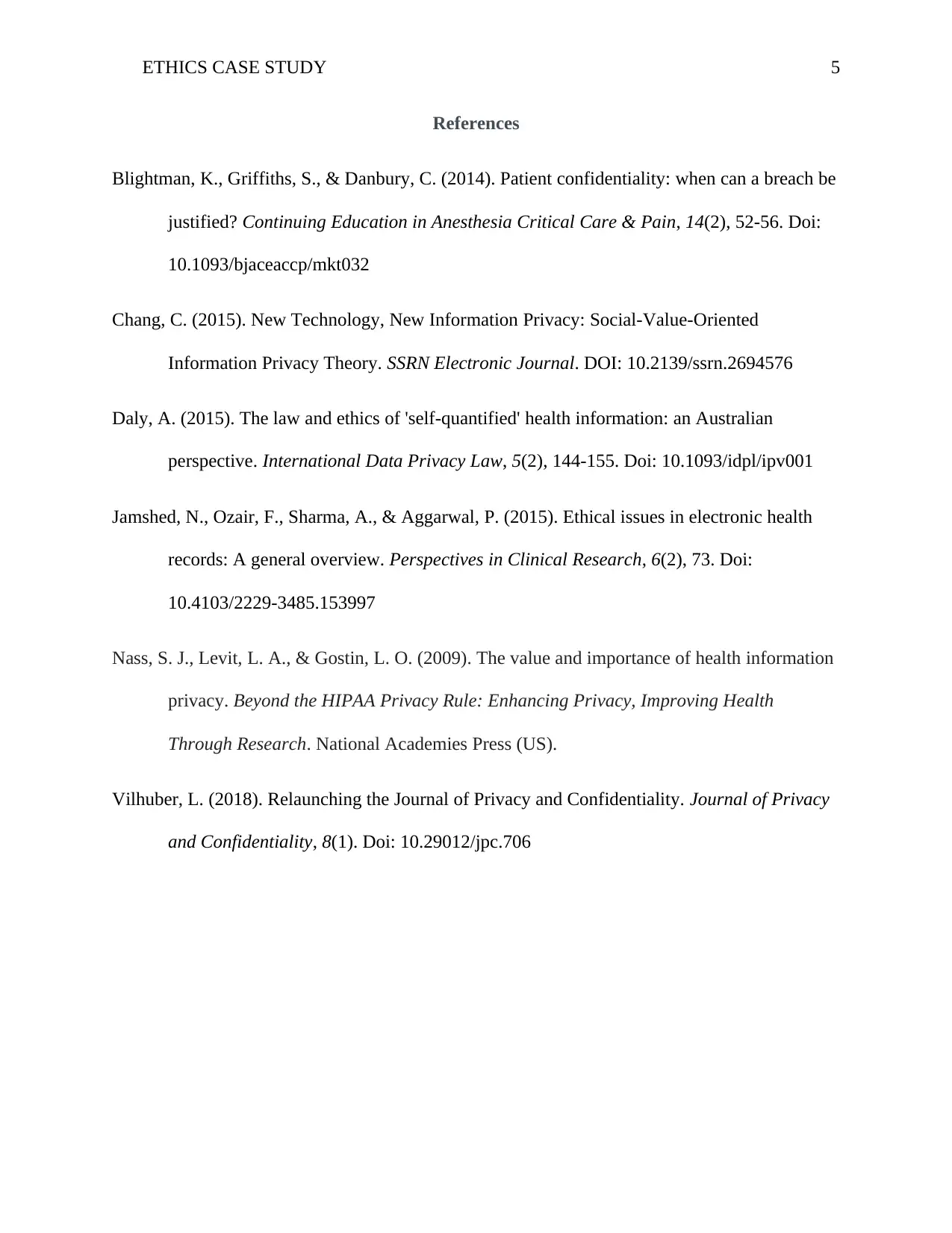
ETHICS CASE STUDY 5
References
Blightman, K., Griffiths, S., & Danbury, C. (2014). Patient confidentiality: when can a breach be
justified? Continuing Education in Anesthesia Critical Care & Pain, 14(2), 52-56. Doi:
10.1093/bjaceaccp/mkt032
Chang, C. (2015). New Technology, New Information Privacy: Social-Value-Oriented
Information Privacy Theory. SSRN Electronic Journal. DOI: 10.2139/ssrn.2694576
Daly, A. (2015). The law and ethics of 'self-quantified' health information: an Australian
perspective. International Data Privacy Law, 5(2), 144-155. Doi: 10.1093/idpl/ipv001
Jamshed, N., Ozair, F., Sharma, A., & Aggarwal, P. (2015). Ethical issues in electronic health
records: A general overview. Perspectives in Clinical Research, 6(2), 73. Doi:
10.4103/2229-3485.153997
Nass, S. J., Levit, L. A., & Gostin, L. O. (2009). The value and importance of health information
privacy. Beyond the HIPAA Privacy Rule: Enhancing Privacy, Improving Health
Through Research. National Academies Press (US).
Vilhuber, L. (2018). Relaunching the Journal of Privacy and Confidentiality. Journal of Privacy
and Confidentiality, 8(1). Doi: 10.29012/jpc.706
References
Blightman, K., Griffiths, S., & Danbury, C. (2014). Patient confidentiality: when can a breach be
justified? Continuing Education in Anesthesia Critical Care & Pain, 14(2), 52-56. Doi:
10.1093/bjaceaccp/mkt032
Chang, C. (2015). New Technology, New Information Privacy: Social-Value-Oriented
Information Privacy Theory. SSRN Electronic Journal. DOI: 10.2139/ssrn.2694576
Daly, A. (2015). The law and ethics of 'self-quantified' health information: an Australian
perspective. International Data Privacy Law, 5(2), 144-155. Doi: 10.1093/idpl/ipv001
Jamshed, N., Ozair, F., Sharma, A., & Aggarwal, P. (2015). Ethical issues in electronic health
records: A general overview. Perspectives in Clinical Research, 6(2), 73. Doi:
10.4103/2229-3485.153997
Nass, S. J., Levit, L. A., & Gostin, L. O. (2009). The value and importance of health information
privacy. Beyond the HIPAA Privacy Rule: Enhancing Privacy, Improving Health
Through Research. National Academies Press (US).
Vilhuber, L. (2018). Relaunching the Journal of Privacy and Confidentiality. Journal of Privacy
and Confidentiality, 8(1). Doi: 10.29012/jpc.706
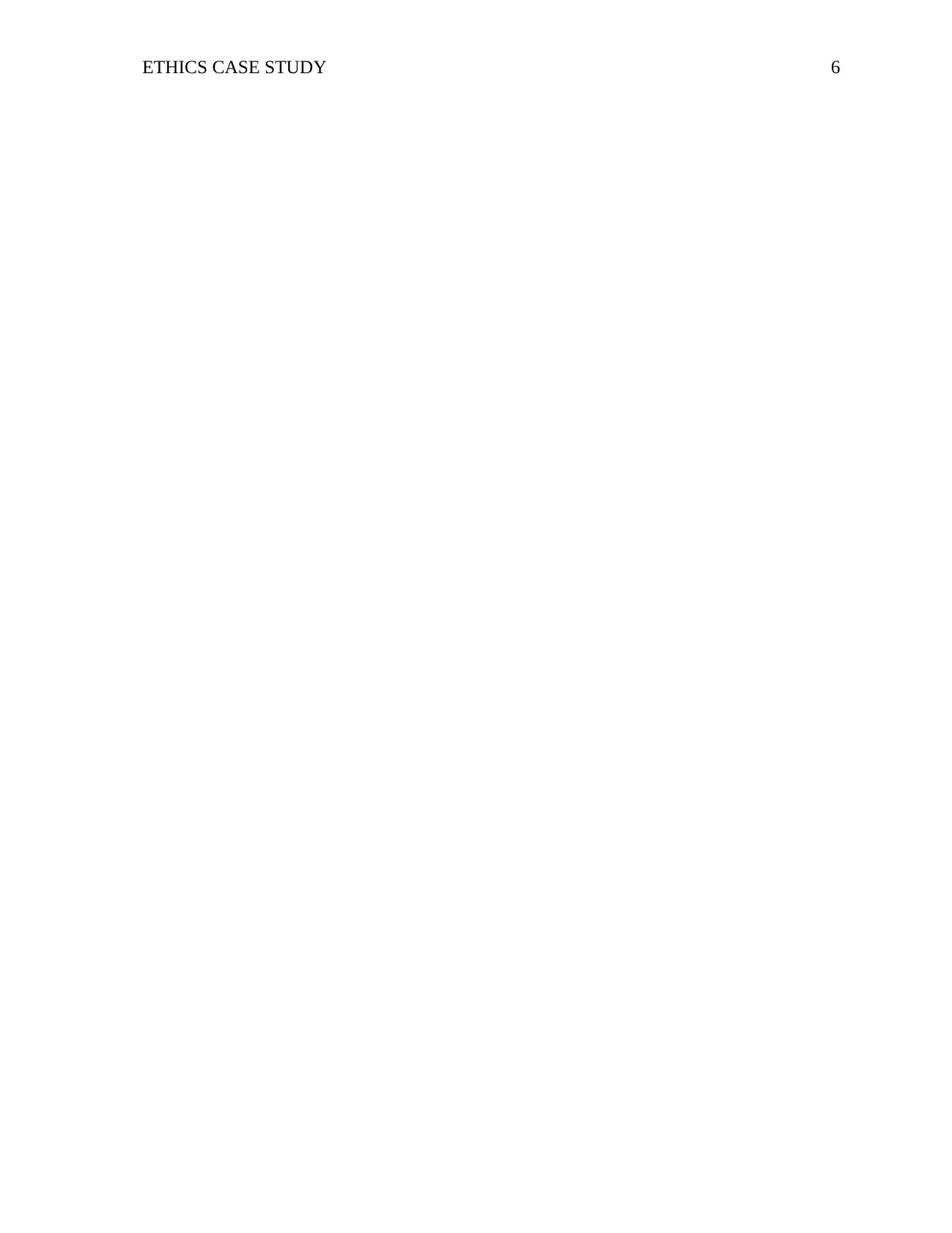
ETHICS CASE STUDY 6
⊘ This is a preview!⊘
Do you want full access?
Subscribe today to unlock all pages.

Trusted by 1+ million students worldwide
1 out of 6
Related Documents
Your All-in-One AI-Powered Toolkit for Academic Success.
+13062052269
info@desklib.com
Available 24*7 on WhatsApp / Email
![[object Object]](/_next/static/media/star-bottom.7253800d.svg)
Unlock your academic potential
Copyright © 2020–2026 A2Z Services. All Rights Reserved. Developed and managed by ZUCOL.





